DG FBR warns Pakistani diaspora in UAE of legal action if amnesty scheme not availed
DG FBR said tax amnesty scheme would conclude soon, which is why Pakistani community in UAE should avail it
June 25, 2019

DUBAI: Pakistani expatriates in the United Arab Emirates (UAE) whitened Rs0.345 trillion in the tax amnesty scheme that the Pakistan Muslim League-Nawaz (PML-N) government introduced, while a total of Rs1 trillion was whitened money in last year’s amnesty scheme, a senior Federal Board of Revenue (FBR) official revealed on Tuesday.
In an event — “Amnesty Structure and its Advantages” — held at the Pakistan Consulate in Dubai, Dr Ashfaq Ahmed, the director-general of international taxes at the FBR, briefed expatriates about the latest amnesty scheme.
The event was held in association with the Pakistan Business Council Dubai (PBC) and the Pakistan Association of Dubai (PAD).
Dr Ahmed stressed that the tax amnesty scheme was ongoing and would conclude on June 30, 2019, which is why he urged the Pakistani community to avail it and declare their assets. Otherwise, he warned that they should be ready for legal action even if one was an expatriate.
In response to a question, Dr Ashfaq said the UAE authorities have shared details about Pakistanis' properties on request of Islamabad, while information pertaining to their bank accounts and money parked in banks in the Emirates was shared automatically.
The FBR official said most of the Pakistanis' foreign money was saved in the UAE, which is why the governmental body chose Dubai to request the diaspora to avail the tax amnesty scheme if they do not have a money trail of their assets.
Dr Ahmed said it was impossible to hide money even in tax havens these days. Some 28 countries shared specific data on Pakistanis' assets this year while another 71 countries will do so next year, he added.
Dr Ahmed hoped that over 100 countries would share the data of Pakistanis over the next two years. Pakistanis’ favourite places to hide money included the UAE, Singapore, England, and Canada, he observed.
Speaking of the current amnesty scheme's goals, he said there were targets but it was not possible to share them with the media at the moment as it could create confusion.
The Pakistani community said they desired tax officials from their home country be employed at the consulate so they could resolve their tax issues.











